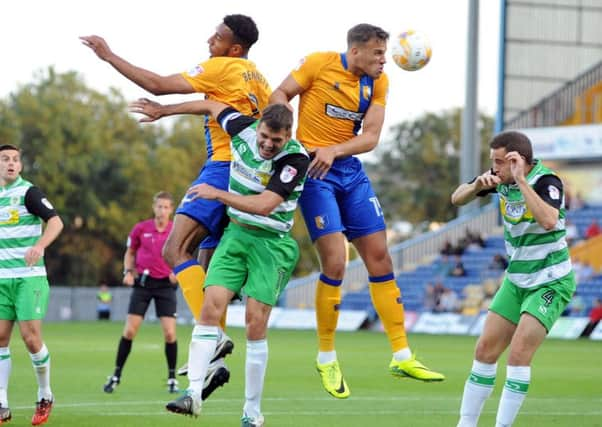OPINION: Olympics highlighted how football can learn from '˜smaller' sports


Fears over the zika virus, corruption and financial problems in Brazil, as well as the late building of some of the venues, created unwelcome headlines for Olympics officials in the build-up to Rio.
There also seemed to be slow interest in this country, partly because of the time difference between the UK and South America.
Advertisement
Hide AdAdvertisement
Hide AdBut once the medals started to roll in, viewing figures rocketed and the public were hooked.
That meant thousands of people started to watch sports that they would otherwise not have paid so much interest in — sports like hockey and taekwondo.
And their exposure on our TV screens has shown that our own national sport has something to learn.
Football has long since held many debates about the rights and wrongs of using technology to help match officials make their decisions.
Advertisement
Hide AdAdvertisement
Hide AdWas the ball over the goaline? Did a player dive? Was a goalscorer offside?
Football has now brought in goaline technology at the highest level and it has proved to be a winner, preventing miscarriages of justice such as Frank Lampard’s ‘goal’ against West Germany in the World Cup in 2010.
Lampard hammered in a spectacular strike with England two goals adrift in Bloemfontein, South Africa, which looked to have given them a lifeline in the last-16 match.
The ball rebounded off the bar and over the line — by a clear margin.
Advertisement
Hide AdAdvertisement
Hide AdBut referee Jorge Larrionda disagreed, play carried on and England went on to lose 4-1 and — as always seems to be the case — returned home early from a major competition.
The ensuing controversy so embarrassed FIFA that Sepp Blatter apologised and goaline technology was ushered in.
But why stop there...
Cricket, for example, has shown for many years in Test matches the virtues of both sides having the right to appeal a decision to an official watching play with the benefit of television replays.
It also works in tennis and now the Olympic Games has show how it also works so well in hockey and taekwondo.
Advertisement
Hide AdAdvertisement
Hide AdThe appeals — limited to just a few per side — are quickly adjudicated and play is not held up for long.
Certainly not as long as some of the furore that seems to surround decisions in football’s Premier League these days.
So isn’t it time for football to embrace technology even further, learn lessons from the Olympics and give the referees and linesmen — yes, linesmen — all the help they deserve.
That was certainly highlighted a week or so ago in the Championship when Ipswich Town had a perfectly good ‘goal’ ruled out, wrongly, for offside after just three minutes of their fierce derby with Norwich City.
Advertisement
Hide AdAdvertisement
Hide AdThe match ended 1-1, meaning Jonathan Douglas wrongly being ruled to be offside cost Ipswich two points.
Yet it would have taken a fifth official a matter of seconds to have established that fact by watching a replay.
There will be numerous similar errors this season that could be put right quickly and simply with the aid of television.
Just look at Leicester City’s two penalty claims in their goalless draw with Arsenal, for example.
Advertisement
Hide AdAdvertisement
Hide AdPerhaps Ipswich and Leicester are not considered ‘big’ enough for something to be done.
But imagine the reaction of Jose Mourinho at Manchester United if something similar was to happen in a derby against his old rival Pep Guardiola at Manchester City?
He would make sure it was back page news for weeks on end — and Sky Sports would devote hours of coverage to his rants.
Why won’t football take every support system going to make sure as many decisions by referees are correct?
Advertisement
Hide AdAdvertisement
Hide AdThe old argument that video replays would slow the game and take too long to be produced and decided upon have proved to be null and void.
Just look how well goalline technology works, not to mention what happens in cricket, tennis, hockey and taekwondo, for example.
In fact, in cricket the replays have started to add to the excitement and atmosphere.
So let’s give it a try. Give each manager one referral per game where he can ask for a decision to looked at again — once the ball has gone out of play.
Advertisement
Hide AdAdvertisement
Hide AdIf the decision was upheld, the referral would be lost; if it was over-turned the referral would remain.
Football should not be too proud to accept that it can learn from other, so-called, smaller sports.